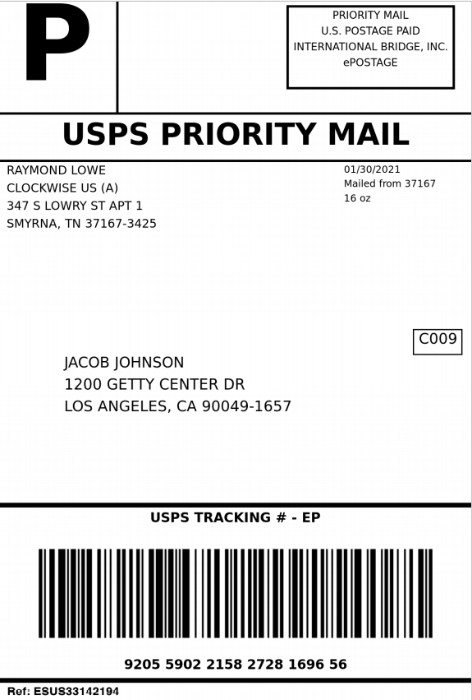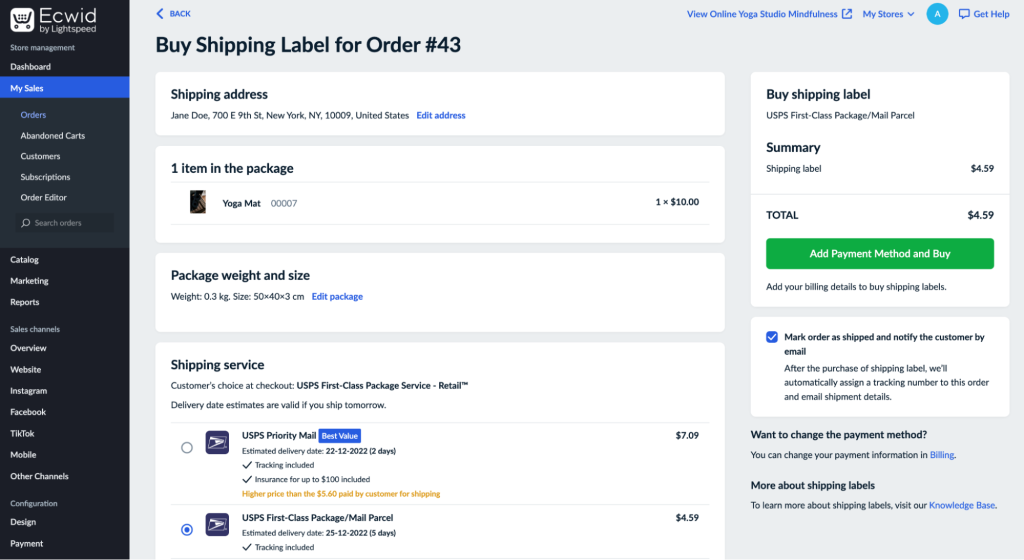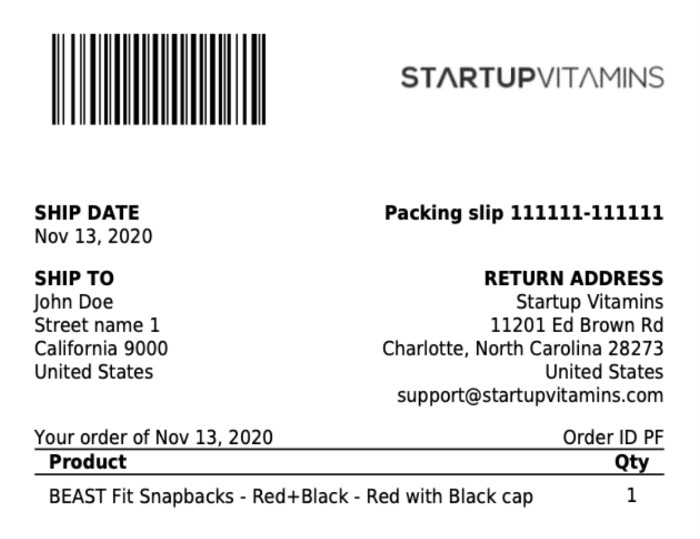As an entrepreneur, you know how important it is to provide great customer service. That includes ensuring your customers get their orders on time and in great condition. The key to this is having the right shipping labels for ecommerce stores.
In this article, we’ll explain the need for shipping labels and how to create, buy, and print them. We’ll also share best practices for creating shipping labels and share how to get them at a discount.
What Are Shipping Labels?
Shipping labels contain information about the shipment, such as the sender’s address, the recipient’s address, and other details related to the package.
Shipping labels are often printed onto sticker paper or thermal paper, making them easy to affix onto packages and waterproof so they won’t be damaged in transit.
A shipping label usually includes the following information:
- Who shipped the package, i.e. its place of origin
- Where the package is being shipped to (i.e. its destination)
- The weight of the package
- Shipping class (express, overnight, etc.)
- Tracking number
- Routing code for postal tracking.
A shipping label can also show billing status (for example,
Let’s look into a

Let’s break down the contents of the shipping label in our example.
The service icon block indicates different USPS services:
- Priority Mail
First-Class MailFirst-Class Package Service- Priority Mail Express
- USPS Retail Ground
- Media Mail
In our example, P stands for Priority Mail. Keep in mind that this applies only to USPS. Other providers might have different service types.
The service type banner states the type of delivery as denoted by the block above. In this case, it’s Priority Mail.
The postage payment area is for showing postage payment information. This section should include the class of mail (such as “Single Piece” or “Presorted”), the city and state of the permit, and the permit number.
With USPS, retailers can apply for a Permit Imprint which allows them to pay for and print shipping information in bulk.
The return address is the address where the package should return in case of
The delivery address is the address you’re shipping the package to. Besides the address, you also have to include delivery route code information and Retail Distribution Codes (RDC). This is a
The tracking code section includes the code you and your customers can use to track the orders. Usually this code is generated automatically.
The additional information section contains any additional details about the package, such as the shipping date or weight.
Most shipping labels follow the same pattern. Usually, you just have to fill out the customer’s address, the return address, and the dimensions of your parcel. The rest is generated automatically by your shipping provider or your shipping software.
Why Are Shipping Labels Important?
Shipping labels help machines and humans in your supply
As you can imagine, failure to create clear shipping labels can result in a logistics disaster. You can lose packages en route, deliver the wrong package and cause
Correct shipping labels provide accurate information about the shipment, which helps ensure that it reaches its destination quickly and safely. They also help speed up delivery times by providing clear instructions for couriers and carriers on where to deliver the package. This way, they can help reduce the loss of packages because they contain valuable information that can be used to trace a package if it gets lost.
How To Create, Buy, and Print Shipping Labels
Creating shipping labels is relatively simple if you have the right tools and resources available to you.
There are two options to create shipping
Creating Shipping Labels Manually
This is a slow method to create shipping labels, but it works if you’re dealing with low volume or are using an ecommerce platform without
Every major shipping service provider allows you to create and buy shipping labels on their website, including USPS, UPS, FedEx, DHL, etc.
The information you provide for creating and buying a label is almost always the same:
- Your (company) name and the name of the recipient
- Shipping weight and dimensions
- Shipping origin
- Shipping destination
- Type of shipping service
- Any additional service options (for example, insurance if you’re shipping a valuable order)
After you fill in all the required information, you’ll be asked to add a payment option. After paying for it, you’ll be able to print your label.

Filling in shipment details for buying a shipping label on the UPS website
After you print a shipping label, you put it on your parcel and drop it off at the nearest post office. Some postal services also allow requesting a package pickup from your house.
Creating Shipping Labels Automatically
Luckily, if your ecommerce platform integrates with the most popular shipping providers, you can spend way less time (and often money) creating and buying shipping labels.
If you sell online with Ecwid by Lightspeed, you can buy and print shipping labels right from your Ecwid admin. All you have to do is click a couple of vital buttons. The shipping labels are automatically prefilled with customers’ information to save you time and avoid typos.
Not only does that save you time, but it’s also more convenient. You don’t need to have a

You can buy a shipping label from the order details page in your Ecwid admin
The best part about buying labels in your Ecwid admin is that it saves you shipping costs. Labels bought through your Ecwid admin are discounted, significantly saving you money, especially when you ship many orders or ship internationally.
You can also choose to automatically assign a tracking number to the order and email shipment details to the customer. Again, less time is spent managing shipping labels and tracking numbers!

You can choose from different shipping services when buying a label in your Ecwid admin
The
If you are from another country, you can buy shipping labels using apps from our App Market.
After you automatically generate a label and print it from your Ecwid admin, you put it on your parcel and either drop it off at the nearest post office or request a pickup by a postal worker.
Best Practices For Creating Shipping Labels
When creating shipping labels, there are a few best practices that should be followed to ensure accuracy and efficiency:
- Make sure all of the information included on your label is correct before printing and
double-check all addresses. - Use
high-quality materials for printing so that your label won’t fade. - Consider investing in a professional label printer if you ship a lot of orders.
- Take advantage of bulk discounts when buying multiple labels. Or, switch to an ecommerce platform that provides discounted shipping labels, like Ecwid by Lightspeed.
What Is a Packing Slip?
Besides shipping labels, you also need to include a packing slip (also called a “waybill”) with your package.
A packing slip is a document that accompanies the package and contains information about the contents of the shipment. It usually looks something like this:

A packing slip is usually included inside a package and contains the following:
- Your company’s name, logo, and address
- The customer’s address
- The order date and order number
- The customer’s contact information
- The names, quantities, and prices of each item included in the package
- Customer service contact in case of any problems with the product
- Optional comments.
The packing slip is essentially a customer receipt. Besides acting as a proof of receipt, it also tells customers what’s included in their
However, the packing slip is not necessary for shipping. Your shipping service won’t mind if you don’t include it with the package.
Usually, your shipping or invoicing software can also create packing slips. You can also create a packing slip yourself in Google Sheets or Excel using templates like this.
If you sell online with Ecwid by Lightspeed, it saves you time with packing slips too. You can use printable invoices as your packing slips. They contain your company name and address, the buyer’s name and
Invoices are generated automatically for your orders and you can print them with just a click. You can also customize your invoice template if needed.

An example of a printable invoice in an Ecwid store that can be used as a packing slip
Alternatively, you can use the Printout Designer app from the Ecwid App Market to create and print packing slips.
Wrap Up
Shipping labels are an essential part of running an ecommerce business as they ensure accurate delivery times and protect against loss of packages during transit. It’s important to understand how shipping labels work to create accurate ones for your customers quickly and efficiently without spending too much time and money in the process.
By following these tips, you will save money and gain peace of mind knowing your customers will receive their orders safely every time.








